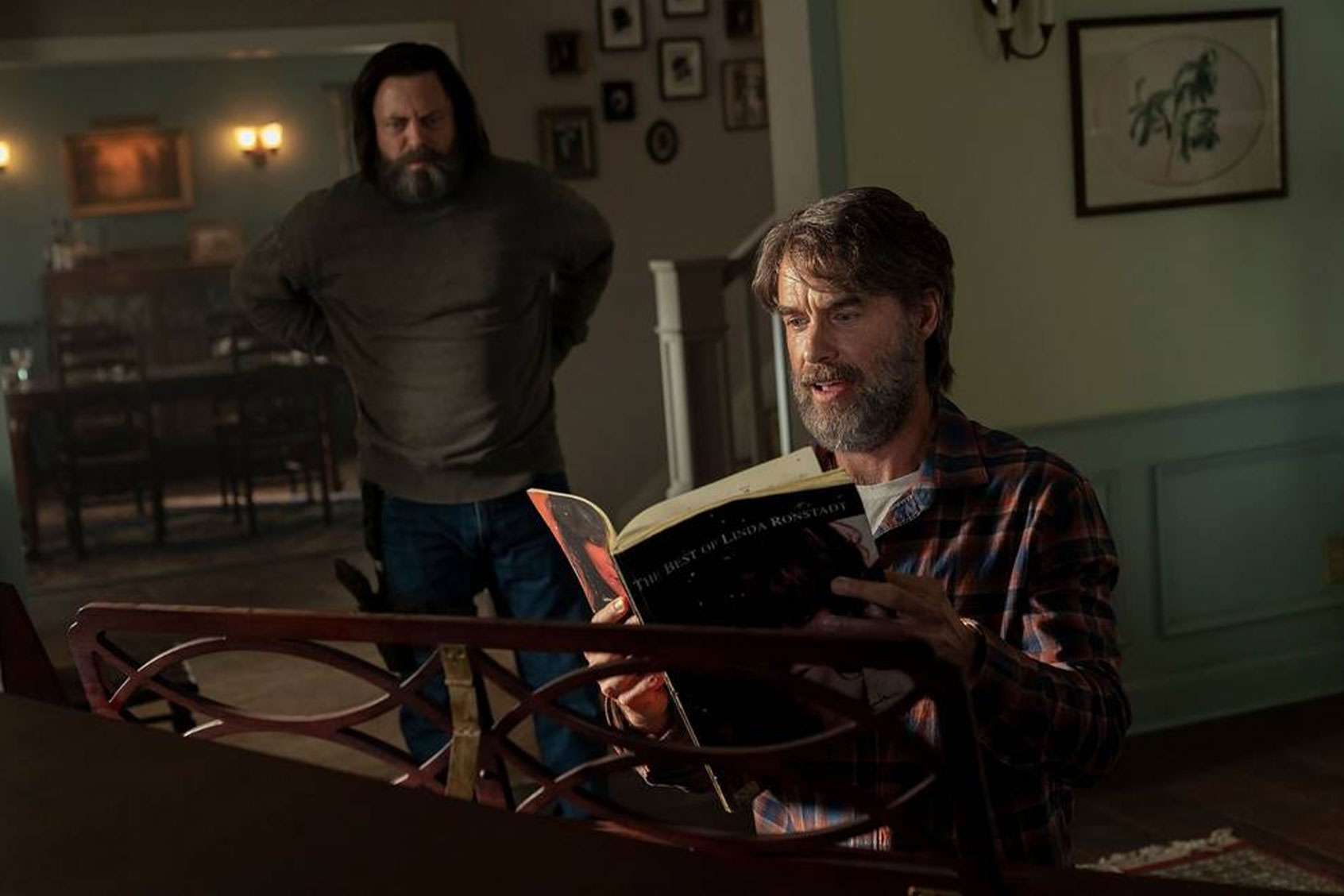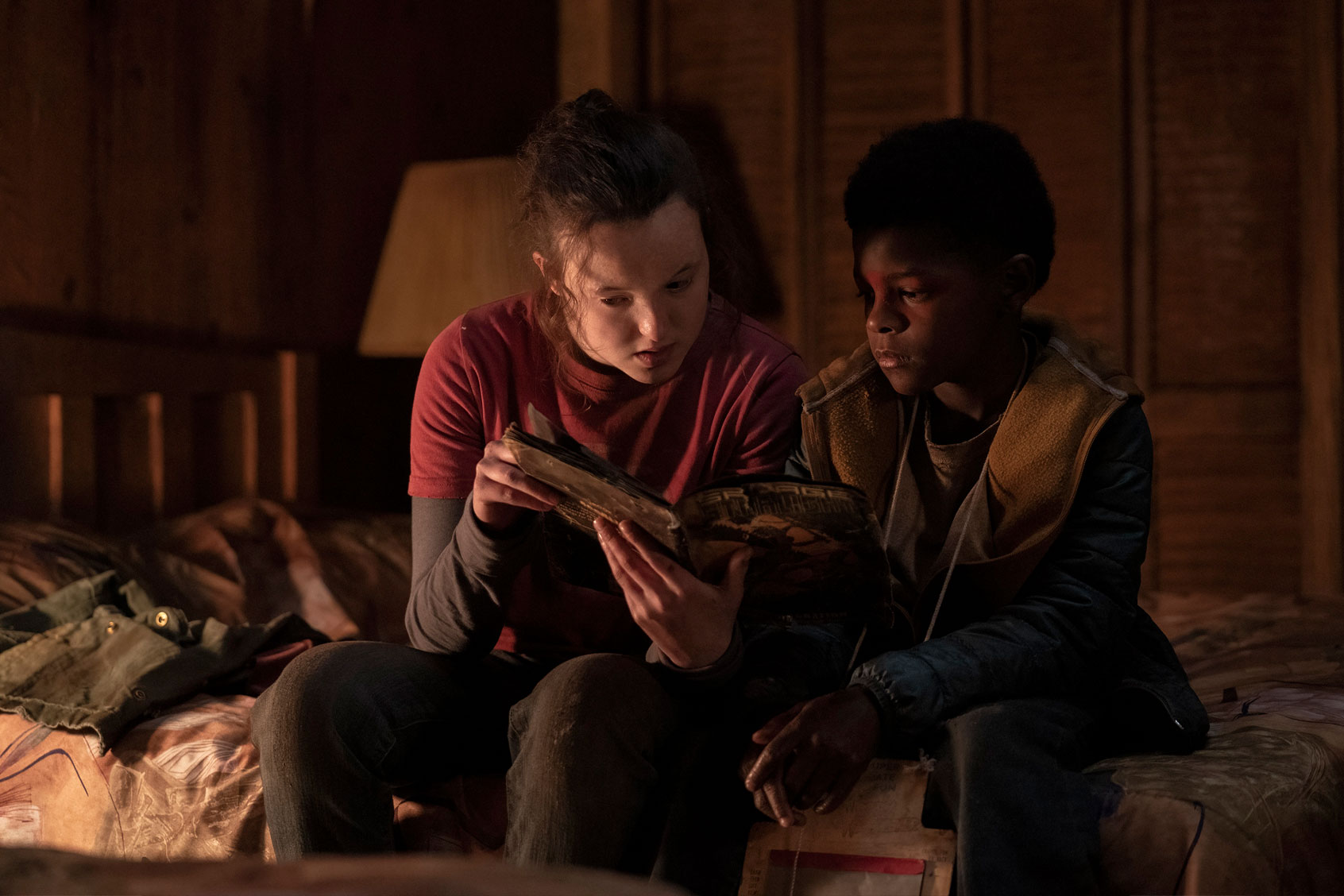What book would you take with you at the end of the world? What book would you carry, occupying precious space in a pack, taking away room for other resources like food, blankets, weapons or water, and adding extra weight? If you’re Ellie, a 14-year-old survivor of a mushroom monster plague, that book is “No Pun Intended: Volume Too.” Welcome to “The Last of Us” book club. Population: puns.
Yes, the book that young Ellie (Bella Ramsey) totes with her on her journey across the devastated United States, dodging clickers along the way, is a joke book, the second in a series by one Will Livingston. The books are not real. Neither is Livingston, but the fact that these are what Ellie clings to through thick, thin and fungal speaks volumes (heh) about how we view childhood and how we relate to each other, even in a hell state.
Is a joke funny if you never experienced it? Is it real to you, or do you just want it badly to be?
The many jokes in the well-thumbed paperback “No Pun Intended: Volume Too” include winners like: “Why did the scarecrow get a promotion? He was outstanding in his field.” Her mentor Joel’s reactions range from stoniness to an eventual groan of laughter which causes him to mumble, “I’m losing it.” Ellie first whips the book out when Joel (Pedro Pascal) is siphoning gas. He’s teaching her an important life-after-disaster lesson, even if he doesn’t know exactly how it works, and she’s teaching him, “It doesn’t matter how much you push the envelope. It’ll still be stationery.”
The jokes take on an extra level of meaning when you consider the book was obviously published pre-disaster. Would Ellie know what stationery is? She didn’t know how seat belts worked. Is a joke funny if you never experienced it? Is it real to you, or do you just want it badly to be? What if you’re not in on the joke of the world?
“No Pun Intended: Volume Too” appears in the video game as well as HBO’s adaptation. In the game, it’s one of Ellie’s most prized possessions. As Tim O’Brien wrote in “The Things They Carried,” his famous linked story collection about an American platoon in the Vietnam War, “They carried all they could bear, and then some, including a silent awe for the terrible power of the things they carried.”
Bill (Nick Offerman) keeps a handy library of survival tomes. Frank (Murray Bartlett) goes immediately to his well-thumbed Linda Ronstadt songbook. Henry (Lamar Johnson) secures a baggie of art supplies for his brother, Sam (Keivonn Woodard), who has a magic eraser board on a string around his neck, essential because it allows the deaf character to communicate with the non-disabled. His other prized possesion? “Savage Starlight” comics, with the catchphrase, “Endure and survive.” And Ellie has “No Pun Intended: Volume Too,” and a love for the same comics. Books allow the children to be children.
 Nick Offerman and Murray Bartlett in “The Last of Us” (Liane Hentscher/HBO)
Nick Offerman and Murray Bartlett in “The Last of Us” (Liane Hentscher/HBO)
Jokes are meant to be communicated. It’s a communal kind of reading, as the teller waits for a reaction.
The pun book is simple, easy. You can drop in and out of it, pick it up at any point and start reading again. Jokes are meant to be communicated. It’s a communal kind of reading, as the teller waits for a reaction. And Ellie and Joel finally start to bond over, of all things, a mermaid’s “Algae bra.” “Last of Us” showrunner Craig Mazin told Syfy Wire, “It was like she kept getting Joel to come a little bit closer and a little bit closer to kind of laughing over these terrible jokes with her. And then at the very end, there’s that moment where she gets him. For the first time . . . Joel laughs. He smiles and he laughs again.”
The book makes Joel more of a dad and Ellie more of a child, cementing their bond. Age-appropriateness is something with which the show struggles. Both Joel and Ellie’s ages were tweaked for the first season, Joel older and Ellie younger, but Ramsey’s performance seems much younger than her character’s 14 and hasn’t yet shown the same kind of self-reliance and competence of Ellie of the game. Maybe it’s something she’s going to age into. Perhaps the pun book is another example of this, or perhaps it’s trauma-induced regression that causes her to cling to it, a relic from a life that was never even hers.
Want a daily wrap-up of all the news and commentary Salon has to offer? Subscribe to our morning newsletter, Crash Course.
The pun book harks back to a time before Ellie’s time and an experience she never lived through: the school book fair. It’s exactly the kind of paperback your child would come home with after book fair day, along with slime and plastic toys that will be forgotten within hours, a haul you would think about to yourself, but never say to your child: You spent money on this? But puns are forever. And a slim joke book by a “comedian,” a reoccurrence to be pulled out during family dinners, vacations, car trips. And of course, during apocalypse journeys.
What will last at the end of the world? Love. Music. Found family. And the everlasting, universal bad joke.
Read more
about “The Last of Us”


